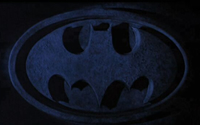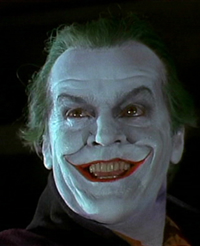The Good Life of Crime
Alexander S. Peak
Also available in .txt and .pdf.
16 January 2006
~~~
ALEX: If there was this guy who dresses up as a bat and goes around catching criminals, would you choose a life of crime?
GRANDMOTHER: …Wait, how did you word that?
ALEX: If there was a guy who dresses up as a bat, goes around, and catches criminals, would you choose a life of crime?
GRANDMOTHER: No.
ALEX: So what’s wrong with all these people in Gotham? If you’re going to choose a life of crime, at least go to some other city, one without a big, flying bat!
~~~
I saw Batman Begins recently. It was good. But, despite popular opinion to the contrary, it certainly had nothing to do with the Batman series started in 1989 by Tim Burton. In Burton’s Batman, Bruce Wayne’s parents were killed by Jack Napier (who would later become the Joker), who was at the time with his friend, Bob the Goon (whom he later murders). In this new Batman film, on the other hand, Wayne’s parents’ murderer was just one guy who is assassinated before Wayne even becomes Batman.
In the Burton version, Bruce Wayne is more or less rather mentally disturbed. Indeed, he’s basically “insane.” Undeniably, he has issues. He dresses up as a bat and goes on near-suicidal missions to fight crime. He doesn’t really care much whether he lives or dies, although he’s not exactly trying to die, either. To put it another way, he accepts—unemotionally—the possibility of his dying. Further, he’s absolutely willing to take a person’s life, as is especially evident when he shoots at the Joker from his Batplane, or when he drops bombs from the wheels of his Batmobile. After meeting a photographer, though, he begins to straighten up, begins to take his life more seriously. As Tim Burton described it, Wayne was insane, but began to regain sanity following meeting her. A crude description, but basically right.
But, this Batman series became a real joke by the fourth episode, which wasn’t directed by Mr. Burton. Whereas Batman (the first episode) and Batman Returns (the second episode) were directed by Mr. Burton, Batman Forever (the third episode) and Batman & Robin (the fourth episode) were both directed by Joel Schumacher.
Bruce Wayne is a man with commitment problems. The only person that’s been there his whole life is Alfred, his butler. His parents, whom he loved, were taken from him (i.e. murdered) when he was very young, and although he does experience love, he has a problem getting close to people. He’s also much riskier with his own life than with the lives of others. This is why he doesn’t like having a partner, and why he holds Robin back. But by episode four, he is shown to accept Batgirl immediately; in reality, this man would have been far more resistant. Let’s face it, the third film wasn’t that great, and the fourth one just blew. This series is dead to me.
The Batman in Batman Begins, directed by Christopher Nolan, is a totally different Batman, and I would argue, a totally different series, than the one started by Tim Burton in 1989, which had fundamentally self-destructed when Mr. Schumacher took over the franchise. This new Batman doesn’t murder. He’s still an outlaw, but he has stricter ethics. This wasn’t a mere prequel, but a completely new revision.
I
would like to see this new series continued further. Let the old one remain dead. I can see both benefits and drawbacks to a new series. First, the drawbacks. Batman Begins ends with the Joker having just begun his Jokering, so if a new series is started, there would have to be a Joker in the sequel. There’d just have to be. But how in the world are they going to find a better Joker than Jack Nicholson? Seriously. You just can’t beat him, or with the smile found in Tim Burton’s 1989 Batman. At least, it would be quite difficult.
The next draw-back is the Batmobile. This new Batmobile, otherwise known as the
Tumbler, just sucks. You can’t beat the Burton Batmobile. You just can’t.
And, the last draw-back is that this Batman is a bit too much of a Boy Scout. You can expect that from pussies like Superman, but not from vigilantes like Batman. The fact that he’s unwilling to kill just makes him…less dark. (Still, Nolan’s Batman is still darker than Schumacher’s Batman, and certainly darker than Adam West.)
And now, for the benefits. The first benefit that comes to mind is Jim Gordon. The guy they got to play G
ordon in Batman Begins looks much more like how Commissioner Gordon is supposed to look than the guy Burton used in Batman. Sure, this Gordon isn’t perfect. He seems a bit too weak, but still, he makes a great Gordon. Besides, the other guy was getting old.
Next, the fact that Batman doesn’t kill does present a benefit: the criminals have greater likelihood of surviving, and can thus have more opportunities to escape from Arkham Asylum—sort of like the cartoon series. This means: more Joker, more Riddler, more Scarecrow, more Catwoman. (Of course, the Riddler and Catwoman were both still alive anyway, and Catwoman was still at large. But the point remains.)
Of course, Batman is an important aspect of “Batman,” but the Villains give it spice. Where would Batman be without the Joker, and where would the Joker be without Batman? They’re each other’s yin and yang.
And, Batman Begins ends with about half of Arkam’s inmates still at large. So, I’d be interested in seeing where they take this,…if they choose to continue it, that is.


